The A-Z of Dementia Research
 Welcome to our A-Z of Dementia Research.
Welcome to our A-Z of Dementia Research.
Each day until Christmas, we’ll open a door on the ‘Join dementia research’ advent calendar and explain the most important terms and topics that surround dementia research.
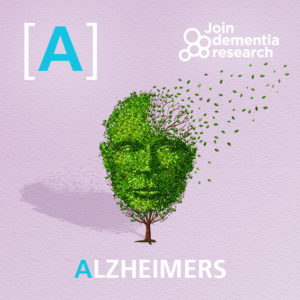 A for “Alzheimer’s disease”
A for “Alzheimer’s disease”
Most people have heard of Alzheimer’s disease, but did you know there are many other types of #dementia? Find out more here.
B for “Biomarkers”
We need to find markers for use in clinical trials to find drugs that can prevent dementia.
C for our Champions
Our champions are vital in helping us spread the word about the importance of dementia research.
 D for “drugs”.
D for “drugs”.
Thanks to research, there are four drugs available to treat some dementia symptoms. Register with Join Dementia Research to help researchers finding new and better treatments.
E for “early diagnosis”
Early diagnosis gives an opportunity to change the trajectory of the disease.
F for “family and friends”
The role of family and friends is crucial. It’s estimated 700k people are informal carer for people living with dementia.
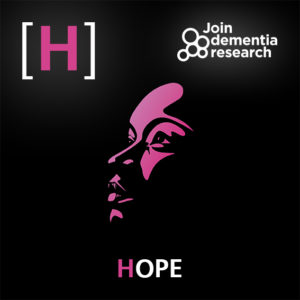 G for “Global”
G for “Global”
Today, almost 50 million people live with dementia worldwide.
H for “hope”
H stands for “Hope“, because research brings hope to people living with dementia.
I for “Involvement”
Patients and public involvement in research is essential if we are to find new and better ways to treat and live with dementia.
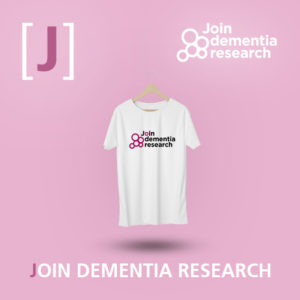 J for “Join Dementia Research”
J for “Join Dementia Research”
Sign up to Join Dementia Research to be matched to suitable studies and accelerate dementia research.
K for “Knowledge”
It’s important to share research findings. Doing it means that good research evidence can be put at the heart of health and social care decisions.
L for “Lifestyle”
Did you know that some lifestyle factors could affect the risk of you developing dementia?
M for “MCI (mild cognitive impairment)”
 M stands for “MCI (mild cognitive impairment)”, a condition in which someone has minor problems with abilities such as memory or thinking.
M stands for “MCI (mild cognitive impairment)”, a condition in which someone has minor problems with abilities such as memory or thinking.
N for “NIHR”
The NIHR is the most integrated clinical research system in the world, driving research forward for the benefit of patients.
O for “opportunities”
O stands for “opportunities”, like the ones that Join Dementia Research will give you to take part in new dementia studies.
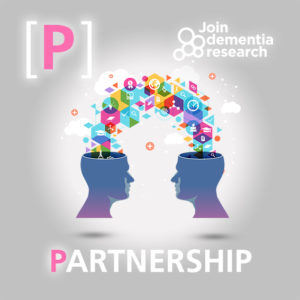 P for “partnership”
P for “partnership”
Working together and sharing research findings will give us the best chance of beating dementia.
Q for “quality of life”
Studies looking at improving quality of life of people with dementia are essential.
R for “representative”
R for “representative“: you can sign up to Join Dementia Reseasrch on behalf of someone else, if they need support.
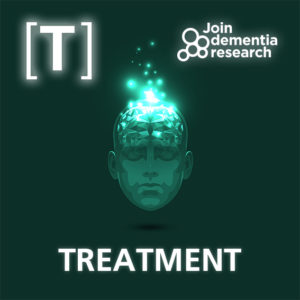
S for “screening”
S stands for “screening“: after you match to a dementia study, researchers will talk to you before you both decide if you’ll take part.
T for “treatments”
It’s not all about drugs: dementia studies can take different forms and have different treatments.
U for “Updating”
U stands for “updating“. Keeping your Join Dementia Research details up to date means you are more likely to match the best studies.
V for “volunteer”.
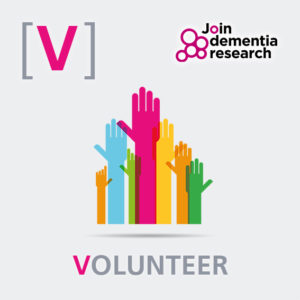 We need more volunteers to ensure more dementia research can happen. You can help us spread the word.
We need more volunteers to ensure more dementia research can happen. You can help us spread the word.
W… WOW!
Wow! Research is making strides towards beating cancer and TB. Only with research can we do the same for dementia.
X for “eXercise”
Does exercise have an impact on risk of getting dementia? Watch this video by Dementia Reporters.
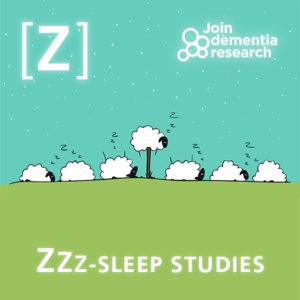 Y for “young (early) onset dementia”
Y for “young (early) onset dementia”
Did you know? Over 42,000 people under 65 have dementia in the UK.
Z for “ZZZ”
40% of people with dementia experience problem with their sleep. Researchers are at work on this!
